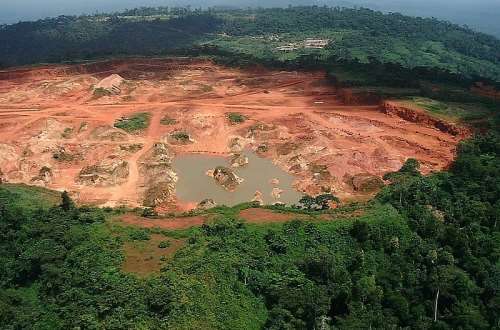The galamsey crisis in Ghana has once again taken center stage, following the announcement by the Acting CEO of the Ghana Gold Board, Mr. Sammy Gyamfi, that the controversial Legislative Instrument (L.I.) 2462 will be repealed once Parliament reconvenes.
Civil society voices under the umbrella of The Coalition have welcomed this development—but with caution and a demand for more than just political symbolism.
For activists and environmental defenders across the country, the repeal of L.I. 2462 is a people-powered victory, not a political favor.
The key issue here is galamsey, and it cuts to the heart of one of the most pressing national emergencies of our time. This unregulated mining menace continues to destroy river bodies, forests, and the livelihoods of rural communities.
“While this development marks a significant step forward, it must be clearly understood as a response to growing public pressure. This victory belongs to the people, the students, communities, activists, and ordinary Ghanaians who have consistently spoken out, marched, and demanded change.”
The Coalition
The L.I. 2462, which controversially gave the President the authority to grant mining permits in forest reserves, has been widely condemned as an affront to environmental protection efforts.
For the Coalition—made up of groups like Economic Fighters League, Wear Ghana, and Green Cycle Movement—its repeal is a relief, albeit one that arrives far too late.
According to them, the L.I. was “a symbol of the state’s complicity in the destruction of Ghana’s natural environment.”
Indeed, critics have long argued that the legal framework behind the galamsey operations gave tacit approval to illegal mining under the guise of executive discretion.
But now, with the promised repeal on the table, the question is: what next?

Midway through their statement, the Coalition called for immediate national focus, stressing that this issue is just one among many pressing concerns.
They highlighted the worsening environmental crisis from galamsey, noting that the country’s rivers continue to suffer from severe contamination. “Our forests are vanishing. The damage is deep and ongoing.”
To this end, the Coalition called for three concrete actions. First, they demanded the immediate repeal of L.I. 2462, insisting that there should be no delays or excuses.
Second, they urged the government to declare a state of emergency on illegal mining to reflect the gravity of the crisis.
Finally, they called for a complete suspension of all small-scale mining activities until a thorough audit and reform of the sector is carried out.
Coalition Rejects Half Measures on Galamsey
Moreover, the Coalition emphasized that these measures are not extreme but essential. They warned that without decisive action, Ghana’s already fragile environment could deteriorate into a severe ecological catastrophe.
The Coalition underscored the urgency of the situation and the critical need for leadership to take full responsibility.

“The repeal of L.I. 2462 must not be used as a political smokescreen or a way to pacify public outrage. It must mark the beginning of a genuine commitment to saving our environment and securing the future of generations to come.”
The Coalition
There’s also the need to acknowledge the people and organizations that have tirelessly kept the issue alive in the national conscience.
The Coalition was deliberate in giving credit to champions like journalist Erastus Donkor, A Rocha Ghana, EcoConscious Citizens, and others who’ve been at the forefront of this struggle, not for fame, but for Ghana’s survival.
Still, the skepticism remains strong. The Coalition fears this repeal might become another short-term concession rather than a decisive turning point. And they are not ready to let their guard down.
“We also acknowledge the efforts of many who have yielded these results… Like then, we will continue to hold the government accountable and to mobilize for real solutions, not gestures.”
The Coalition

In many ways, the Coalition’s stance embodies the frustration of citizens who have seen the effects of galamsey firsthand—communities losing access to clean water, forests reduced to barren wastelands, and children falling sick from toxic exposure.
Ghanaians are no longer interested in political gymnastics; they want action, and they want it now.
The government must therefore rise to the occasion. Empty promises won’t clean poisoned rivers.
Half-measures won’t regrow felled forests. And a single legislative repeal won’t undo years of environmental degradation. What the country needs is courageous leadership and a decisive break from the cycles of negligence that have fueled illegal mining for far too long.
In the end, the galamsey fight is not just about mining—it’s about survival, sovereignty, and stewardship of a land that must serve not only the present but the generations yet to come.
READ ALSO: Reeves Prioritizes EU Reset Over U.S. Deal




















